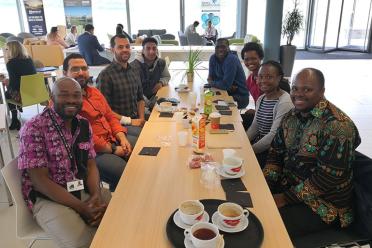NBI Africa Initiative: telling the untold story of research excellence in Africa
The Africa Initiative launches to celebrate and cultivate collaborations between NRP and Africa, while providing a home away from home for African researchers.
Norwich Research Park has a thriving community of scientists from Africa, as well as a vast number of research projects spanning aquaculture, crop improvement and human health throughout the African continent. The Norwich Bioscience Institutes Africa Initiative is here to facilitate more such efforts, and to celebrate research excellence in Africa, while establishing a base for African researchers and cross-continental collaborations to prosper.
Norwich Research Park (NRP) is home to scientists from all over the world and the Norwich Bioscience Institutes (NBI) Africa Initiative (NBIAI) is helping researchers to spread their roots here in the UK, while promoting the pioneering research and capacity building projects that take place between the Earlham Institute (EI), John Innes Centre (JIC), Quadram Institute Bioscience (QIB), The Sainsbury Laboratory (TSL), and African institutes.

We were delighted to meet with the leaders of this group, who enthused us with a spirit of community and collaboration across the research institutes of NBI, and between the continents of Africa and Europe. We asked them how the Africa Initiative began, what it hopes to achieve, and how we can help tell the untold stories of research excellence between the NBI and African institutes.
Cyrielle Ndougonna, Chair of the Africa Initiative and a PhD student at JIC, told us how it all began:
“It all started with an idea to bring together African staff and students across the different institutes. An opportunity presented itself when the JIC and the BecA-ILRI Hub in Nairobi, Kenya, launched the Alliance for Accelerated Crop Improvement in Africa (ACACIA). This partnership seeks to empower the African research community to undertake world-leading agricultural research in Africa. The launch revealed the need to bring about a platform within the NBI to harness and promote scientific endeavours geared towards Africa.”
There is a growing African research community within the NBI. Currently, there are about 17 members - including two predoctoral students, eight PhD students and five postdocs and staff members - from nine African countries: Cameroon, Chad, Egypt, Eritrea, Ghana, Kenya, Malawi, Nigeria and Zimbabwe. There are also frequent visitors to the NBI from African institutes, with emerging collaborations and networks, such as the East Africa Network for Bioinformatics Training (EANBiT), which is part of an increasing number of capacity building programmes in the region.
As highlighted by Cyrielle, the Africa Initiative has three main goals: firstly, to promote the science being done between the NBI and African institutes; secondly, to establish a platform where people can share knowledge and experience from these collaborations; and finally, to provide support for African researchers on campus.


In the media, Africa is often synonymous with poverty. What about the stories of research excellence? No one else will tell that story. We will tell that story.

One of the principle aims of the Africa Initiative is to help integrate Africans visiting or settling in Norwich to life at the NBI. Anyone who has moved to a new country can testify to how hard it can be to adjust at first.
Dr Anthony (Toni) Etuk, a computer scientist at the Earlham Institute, explained:
“When I first arrived in the UK from Nigeria, I got hit by a wall of reality: what am I going to eat? Sandwiches? Where’s the cassava, or the other food I’m used to? Is it mashed potato forever more?
“It can be a big culture shock.”
Ngoni Kangara, a PhD student at JIC, who will be leading the communications around the Initiative, echoed the same challenges in acclimatising to a new environment. “You have to take in a lot of information about the ‘unwritten rules’ of the local culture in a very short space of time,” he said.
“At the same time there can be expectations from your employer and colleagues that you will hit the ground running. That can create a bit of anxiety and you can feel isolated. Meeting with people who have navigated these issues is certainly comforting, and you won’t have to struggle as much as if you were on your own.”

Another aspect to the Africa Initiative is to celebrate success and “take a step back and focus on the untold stories,” Toni told us. “In the media, Africa is often synonymous with poverty. What about the stories of research excellence? No one else will tell that story. We will tell that story.”
There are some fantastic examples of research projects already taking place between the NBI and research institutes in Africa. One example is EI’s work in improving freshwater aquaculture in Tanzania alongside the international organisation WorldFish, which a recent impact report suggests will be worth an extra $12.4million to the tilapia economy of Tanzania and Malawi.
Scientists from the John Innes Centre and the Sainsbury Laboratory are working on a variety of projects looking at crop improvement and developing diagnostic tools to combat the threat of emerging crop pathogens. At the Quadram Institute Bioscience, researchers are working to improve the safety and nutritional content of traditional African fermented foods.
An integral member of the group, Dr ThankGod Ebenzer of EI, pointed me toward a fantastic success story just down the road from Norwich with Cambridge-Africa, a programme similar to the Africa Initiative. Cambridge-Africa has been going strong with a number of long-term collaborations between the University of Cambridge and African researchers. They hope to replicate this success with NBIAI.
The formal launch of the Initiative will take place on the 28th of February, 2020. The theme of the event is: Biosciences and Innovation: promoting research excellence in Africa. A keynote address will be delivered by Professor Appolinaire Djikeng, Director of the Centre for Tropical Livestock Genetics and Health (CTLGH).